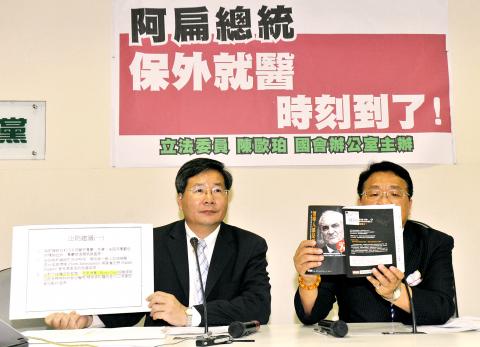Former president Chen Shui-bian (陳水扁) is suffering from various ailments, and it would not be good for him to return to prison, his attending physician told lawmakers yesterday.
Chou Yuan-hua (周元華), a psychiatrist in charge of Chen’s care at Taipei Veterans General Hospital (TVGH), added that it would be better for the former president to be looked after at home or to stay in a hospital that has a psychiatry department near his home.
When Democratic Progressive Party (DPP) Legislator Hsiao Bi-khim (蕭美琴) asked if there was a possibility that Chen might commit suicide if he were sent back to Taipei Prison, Chou said: “There is definitely a possibility.”

Photo: Chen Chih-chu, Taipei Times
Chou was giving a report on the former president’s current condition at a meeting of the legislature’s Foreign Affairs and National Defense Committee.
After nasal septum deviation surgery recently, Chou said Chen’s sleep apnea has improved, but there was a high risk of a relapse.
Chou added that Chen’s speech impediment had not visibly improved over the past half year. Two brain magnetic resonance imaging (MRI) exams found that he has cerebral atrophy and hand tremors, and doctors are still monitoring these conditions.
While there seem to be signs that Chen is recovering from severe depression, he still suffers from anxiety and insomnia, Chou added.
“I know that Taipei Prison has tried to improve Chen’s environment in the prison, but the treatment of severe depression should factor in the atmosphere and the patient’s mental state. I believe it would not be good for Chen to go back to prison now,” Chou said.
TVGH superintendent Lin Fang-yue (林芳郁) told the meeting that TVGH is a hospital for the treatment of severe and emergency conditions. While Chen’s immediate symptoms have been treated, depression is a chronic disease that requires lengthy treatment in a psychiatric ward.
Despite the doctors’ report, Deputy Minister of Justice Chen Ming-tang (陳明堂) reiterated that Chen’s current medical treatment is sufficient to care for his long-term health, and his condition does not qualify him for medical parole.
DPP Legislator Chen Ting-fei (陳亭妃) said it was very clear that the medical report says Chen should be cared for at home and that he should not go back to the prison, but the ministry does not seem to comprehend the report.
Chen Ming-tang said the ministry would evaluate TVGH’s report and make a decision in three weeks.
The former president is serving a 20-year sentence for corruption.

Taiwanese can file complaints with the Tourism Administration to report travel agencies if their activities caused termination of a person’s citizenship, Mainland Affairs Council Minister Chiu Chui-cheng (邱垂正) said yesterday, after a podcaster highlighted a case in which a person’s citizenship was canceled for receiving a single-use Chinese passport to enter Russia. The council is aware of incidents in which people who signed up through Chinese travel agencies for tours of Russia were told they could obtain Russian visas and fast-track border clearance, Chiu told reporters on the sidelines of an event in Taipei. However, the travel agencies actually applied

Japanese footwear brand Onitsuka Tiger today issued a public apology and said it has suspended an employee amid allegations that the staff member discriminated against a Vietnamese customer at its Taipei 101 store. Posting on the social media platform Threads yesterday, a user said that an employee at the store said that “those shoes are very expensive” when her friend, who is a migrant worker from Vietnam, asked for assistance. The employee then ignored her until she asked again, to which she replied: "We don't have a size 37." The post had amassed nearly 26,000 likes and 916 comments as of this

New measures aimed at making Taiwan more attractive to foreign professionals came into effect this month, the National Development Council said yesterday. Among the changes, international students at Taiwanese universities would be able to work in Taiwan without a work permit in the two years after they graduate, explainer materials provided by the council said. In addition, foreign nationals who graduated from one of the world’s top 200 universities within the past five years can also apply for a two-year open work permit. Previously, those graduates would have needed to apply for a work permit using point-based criteria or have a Taiwanese company

The Shilin District Prosecutors’ Office yesterday indicted two Taiwanese and issued a wanted notice for Pete Liu (劉作虎), founder of Shenzhen-based smartphone manufacturer OnePlus Technology Co (萬普拉斯科技), for allegedly contravening the Act Governing Relations Between the People of the Taiwan Area and the Mainland Area (臺灣地區與大陸地區人民關係條例) by poaching 70 engineers in Taiwan. Liu allegedly traveled to Taiwan at the end of 2014 and met with a Taiwanese man surnamed Lin (林) to discuss establishing a mobile software research and development (R&D) team in Taiwan, prosecutors said. Without approval from the government, Lin, following Liu’s instructions, recruited more than 70 software